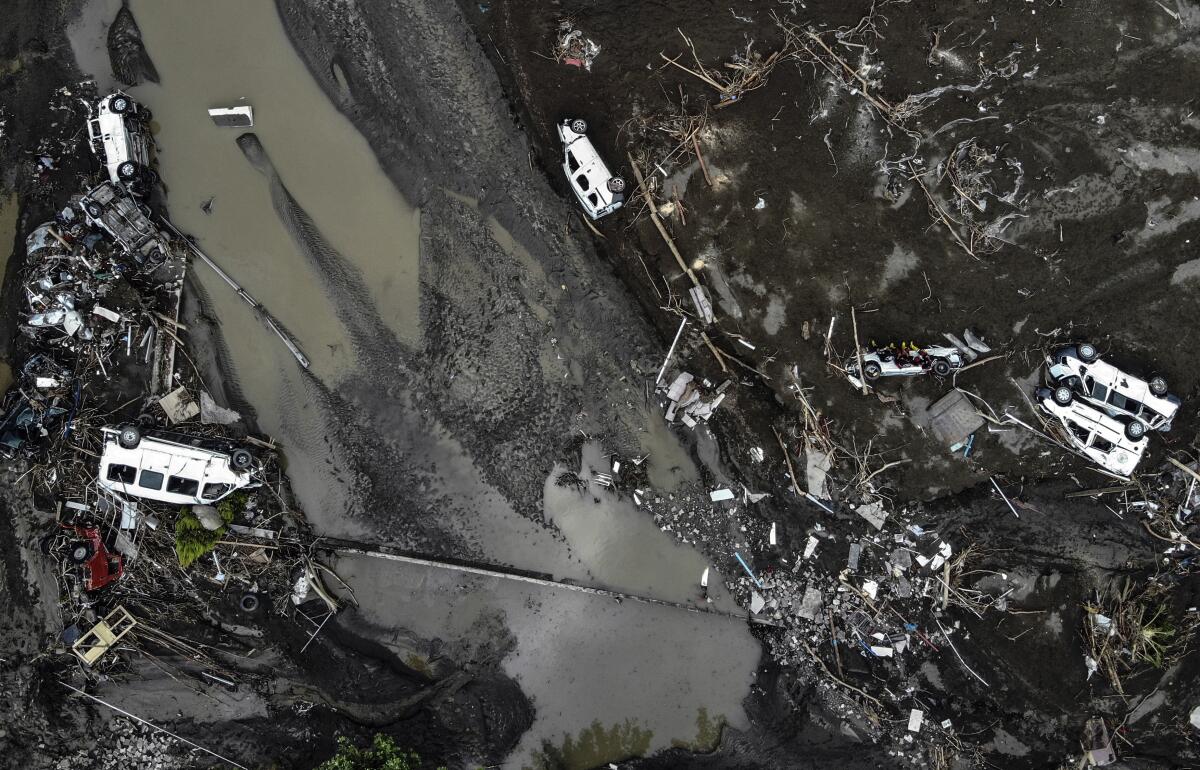Flood deaths in Turkey rise to at least 57 as rescuers push on

- Share via
ISTANBUL, Turkey — The death toll from severe floods and mudslides in coastal Turkey has climbed to at least 57, the country’s emergency and disaster agency said Saturday, as authorities disputed reports that dozens more were missing.
Torrential rain that pounded the Black Sea provinces of Bartin, Kastamonu and Sinop on Wednesday caused flooding that demolished homes, severed at least five bridges, swept away cars and rendered numerous roads unpassable. Turkey’s Disaster and Emergency Management Presidency, or AFAD, said 48 people were killed in Kastamonu, eight in Sinop and one in Bartin.
Eight people remained hospitalized, according to the agency.
Speaking late Saturday in Kastamonu, Interior Minister Suleyman Soylu said 15 of the dead had not yet been identified. He slammed opposition parties, social media users and media for claims that hundreds could be missing. He said a total of 77 cases of missing people remained in Kastamonu and Sinop but emphasized that doesn’t necessarily mean they are dead. He added the previous number of missing was 143, including duplicate names and some reached alive.
The Kastamonu provincial governor’s office also said reports that there were 250 to 300 unidentified bodies were untrue. It did not specifically address how many people might be missing in the flooding.
In Sinop, floodwaters almost completely wiped out the village of Babacay, leaving toppled homes, damaged bridges and rubble in their wake. A five-story apartment building constructed on a riverbed was destroyed, along with numerous homes.
Rescue teams and sniffer dogs kept up their painstaking task of trying to find the missing. AFAD said 5,820 personnel, 20 rescue dogs, 20 helicopters and two search planes were at the disaster spots.
Taliban capture of northern city of Mazar-i-Sharif is a blow to the embattled Afghan government.
About 2,250 people were evacuated across the region before, during and after the floods, some lifted from rooftops by helicopters. Many were being temporarily housed in student dormitories, authorities said.
Climate scientists unequivocally say that climate change is leading to extreme weather events as the world warms because of the burning of coal, oil and natural gas. Such calamities are expected to happen more frequently as the planet warms.
Experts in Turkey, however, say interference with rivers and improper construction also were contributors to the massive damage in Turkey’s floods.
Geologists have said that construction narrowed the riverbed and the surrounding alluvial flood plain of the Ezine stream in Kastamonu’s Bozkurt district, where the damage was most severe, from 1,312 feet to 49 feet. Residential buildings were built along the waterfront.
During severe rains, the contracted stream has limited area in which to move and can overflow. Videos posted by residents showed water rushing downstream in Bozkurt as the surrounding buildings and roads flooded.
One geologist, Ramazan Demirtas, explained the riverbed narrowing on Twitter and said that humans were to blame for this week’s disaster.
Across the Black Sea, days of heavy rain also produced flooding in broad areas of southern Russia. Authorities in the Krasnodar region said Saturday that more than 1,400 houses flooded following storms that swept the area this week. About 108,000 residents of 11 settlements were left without power.
The regional emergency headquarters said a total of 1,531 people have been evacuated. The Black Sea resort city of Anapa was among the worst affected. Officials have warned that heavy rain was expected for two more days.
The floods struck on the heels of wildfires in southern Turkey that devastated forestland in the seaside provinces of Mugla and Antalya, which are popular with tourists. At least 16 people died in the wildfires, including eight emergency workers whose firefighting plane crashed Saturday, and thousands of residents and tourists were forced to flee.
More to Read
Sign up for Essential California
The most important California stories and recommendations in your inbox every morning.
You may occasionally receive promotional content from the Los Angeles Times.














